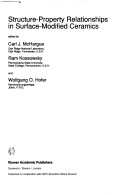Nato Science Series E:
1 primary work
Book 170
Structure-Property Relationships in Surface-Modified Ceramics
Published 31 July 1989
The use of ion beams for the modification of the structure and properties of the near-surface region of ceramics began in earnest in the early 19805. Since the mechanical properties of such materials are dominated by surface flaws and the surface stress state, the use of surface modification tech niques would appear to be an obvious application. As is often the case in research and development, most of the initial studies can be characterized as cataloging the response of various ceramic materials to a range of ion beam treatments. The systematic study of material and ion beam parameters is well underway and we are now designing experiments to provide specific information about the processing parameter - structure-property rela tionships. This NATO-Advanced Study Institute was convened in order to assess our current state of knowledge in this field, to identify opportunities and needs for further research, and to identify the potential of such processes for technological application. It became apparent that this class of inorganic compounds, loosely termed ceramics, presents many challenges to the understanding of ion-solid inter actions, the relationships among ion-beam parameters, materials parameters, and the resulting structures, as well as relationships between structure and properties. In many instances, this understanding will represent a major extension of that learned from the study of metals and semiconductors.
